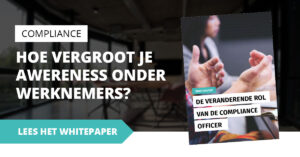Social compliance: meeting the standards of 17 million industry regulators
Blog / News | 03-09-20
Why being compliant is not enough in today’s society
Global online connectivity empowers people to be whoever they want to be. On social media, everyone’s an author. Everyone’s a publisher. Everyone’s a reviewer. Everyone’s a journalist. And… everyone’s an industry regulator. Anyone with decent penmanship has a platform to complain about the policy you pursue as a company, even if you do everything by the book. People get particularly worked up about matters of public interest, such as sustainability, animal rights, privacy, and security. Likes and, especially, dislikes are shared with the whole world with just a few clicks. And soon the discontent goes viral. So, how do you stay ahead of this? Read more about the phenomenon of social compliance and what it means for your company.
Do (no) good
You can’t sweep anything under the rug anymore. Not doing good (such as not using recycled plastic) is something you can’t get away with these days. Or not doing as you say when it comes to taking your corporate social responsibility – the well-known phenomenon of greenwashing. You can hide all the skeletons you want in your closet, they will come out sooner or later. And when they do, it’s too late to save your reputation. This has been an issue ever since social media became such an integral part of our lives. What is a more recent development, however, is the fierce criticism directed at people and companies who do play by the rules but still trigger negative perceptions from the general public. Take the case of the Dutch member of parliament Klaas Dijkhoff, for example, who received income top-up benefits when he became a member of parliament after having served as a minister and state secretary for two years. He was fully entitled to these benefits and therefore did nothing wrong when he claimed them. Even so, it caused a major uproar in society when it came out. So, even if you play by the rules and are compliant on paper, your reputation can still get dented.
Sooner or later, all your skeletons will come out of your closet. And when they do, it’s too late to save your reputation.
Everyone’s a judge
As soon as people get wind of your – perceived – failure to treat your employees, customers, or the environment right, you are in trouble. The people will pass judgment on you. You will be forced to explain what you did, and why. You are guilty until proven innocent. Or not even then. The damage done to your image is potentially devastating and may even be irreparable. After all, public opinion does not just go away, especially if you had not yet built a cast-iron squeaky-clean image that could absorb the blow to some extent. You’ll have to start rebuilding your image from scratch – without giving the impression of being a greenwasher, or worse still, without being one. Good luck with that. It is the nightmare of every corporate director and compliance manager.
17 million industry regulators: social compliance
To prevent this, you are going to have to go further than the bare minimum. Do not wait and see, but be proactive. Make sure you truly have your house in order and do everything you can to prevent any perceived or actual shortcomings. Complying with regulations alone may be good enough for the official industry regulator, but it is not for the people, the 17 million unofficial industry regulators in the Netherlands. This is what we call “social compliance”. People (including employees and companies you want to do business with) expect you, as a company, to contribute to society.
It should not take a wrong step, or being accused of having made a misstep, to get on a better path. Be a role model as a company. Because you are one. Take far-reaching measures to treat people, animals, and the planet to the highest standards of safety, security and sustainability. Look beyond what the law requires you to do: “This is the new norm. This is what we believe is necessary to make a difference.”
Complying with regulations alone is not good enough for the people, the 17 million industry regulators in our country.
A unique soul
Will this set you apart from your competition? It may. But a competitive edge should not be your motivation, just like those 17 million online industry regulators should not be your motivation. The desire to do good should come from within your (company’s) heart. That consumers subsequently choose your product or service because choosing your morally sound company reflects so well on their own image and soothes their conscience, is a bonus. However, if you are indeed in it to convert souls to your brand, people will soon see right through the one-dimensionality of your soul.
It is not just the law and the small print you need to respect.
It is the unwritten rules of contemporary society that make all the difference.
The unwritten rules
It is not just the law you need to respect. After all, laws are often made in response to abuses, crises, emergencies, etc. It is not the small print either. It is the unwritten rules of contemporary society that make all the difference. The rules and standards that people set for companies and how they do business.
So take your responsibility as a company. Set the tone. And you will be well on your way towards social compliance.
Do you want to read more about compliance? Click here to find our Dutch whitepaper about the changing role of compliance and the Compliance Officer.

